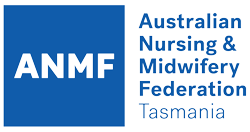The ANMF Welcomes Budget Commitments
26 October 2022
The ANMF has welcomed Labor’s Federal Budget, following it being handed down last evening, which contained the funding to implement Labor’s pre-election commitments, particular with respect to Aged Care.
“The Federal Budget was one which was anticipated – one which delivered on a raft of pre-election commitments; however, it is pleasing to see the Budget allocation to fulfill these commitments, particularly in regard to aged care”, said ANMF Tasmanian Branch Secretary, Emily Shepherd.
Key funding commitments for health included:
- Cheaper Medicines Policy to reduce the patient co-contribution
- Extended COVID-19 Funding for Emergency and Hospitals response, COVID-19 medicines and Medicare rebates, PPE, Rapid Antigen Tests and COVID-19 vaccines and treatments
- Extension of the nurse led Rare Disease Telehealth Program
- Funding to the National Melanoma Network with inclusion of funding for more Nurses in each State, including Tasmania
- Funding for roll out of urgent care clinics over 4 years, with funding over the next two years for pilots, with one pilot allocated to Brighton for a walk-in clinic
- Fixing the Aged Care Crisis to have a registered nurse onsite 24 hours per day, 7 days a week from 1 July 2023 and increasing care minutes to 215 minutes per resident per day from 1 October 2024
- Funding to improve aged care infrastructure and services that provide additional support to older First Nations peoples, and older Australians from diverse communities and regional areas
- Funding to establish the Aged Care Complaints Commissioner within the Aged Care Quality and Safety Commission from December 2022 and to increase financial transparency through the introduction of new financial reporting requirements for residential aged care providers
- Funding to the Maggie Beer Foundation for better food within the residential aged care and home care recipients
- Funding to establish a national registration scheme and code of conduct for personal care workers in the aged care sector
- The Government will also improve aged care quality with employment requirements to preference direct employment of staff, regulation of aged care providers and cap administration and management fees charged by provider in the Home Care Package Program
- Funding to Implement Aged Care Reform over 4 years from 2022–23 to improve the delivery of aged care services and respond to the Final Report of the Royal Commission into Aged Care Quality and Safety
- The ANMF received funding to establish the National Nurse and Midwife Health Support Service over 4 years to establish the National Nurse and Midwife Health Support Service to provide counselling and health support services to nurses and midwives
- Funding allocated for cheaper childcare which will include: increasing the maximum Child Care Subsidy (CCS) rate from 85 per cent to 90 per cent for families for the first child in care and increase the CCS rate for all families earning less than $530,000 in household income and will maintain the current higher CCS rates for families with multiple children aged 5 or under in child care, with higher CCS rates to cease 26 weeks after the older child’s last session of care, or when the child turns 6 years old
- The Australian Competition and Consumer Commission also been tasked to undertake a 12 month inquiry into the cost of child care and the Productivity Commission to conduct a comprehensive review of the child care sector
- Funding to Expand paid parental leave reaching six months paid leave in 2026 including a portion for each parent
- Expanding Newborn Screening – world-class newborn bloodspot screening programs to increase the number and consistency of conditions screened through the newborn bloodspot screening programs
- Improving Access to Care (Type 1 diabetes) over 4 years to expand the Continuous Glucose Monitoring Initiative to provide subsidised glucose monitoring devices to all people with type 1 diabetes
- Improving Primary Care in Rural and Regional Australia to fund local health investment projects in rural and regional locations to improve primary care outcomes and reduce pressure on hospital emergency departments. This funding includes:
- $20.6 million over 4 years from 2022–23 to establish a new cancer support pilot program at the W.P. Holman Clinic, and to support the construction of a new hospice, located within the Launceston General Hospital Precinct, to improve palliative care in northern Tasmania
- Funding to establish develop a medical research centre within the Launceston General Hospital in Tasmania
- Medicare Benefits Schedule – new and amended listings to amend the Medicare Benefits Schedule (MBS) to improve access to primary health care services and improve clinical practice
- Strengthening Women’s Health During Pregnancy – stillbirth autopsies: $13.9 million over 3 years from 2022–23 to support bereaved parents by increasing the number of stillbirth autopsies and providing additional support services.
“These initiatives will have a positive impact on health care delivery in Tasmania as well on cost of living in particular for a female dominated nursing and midwifery workforce with increased child care subsidies which are relied upon by a shift working profession.
“There is no doubt that there is more work to be done in addressing the strategic needs of the nursing and midwifery professions more broadly in the next Federal Budget, but this is certainly a solid foundation upon which to establish those future strategic measures on,” Ms Shepherd said.
Media contact:
Emily Shepherd, ANMF Tasmanian Branch Secretary
Mobile: 0400 884 021
Email: Emily.shepherd@anmftas.org.au
